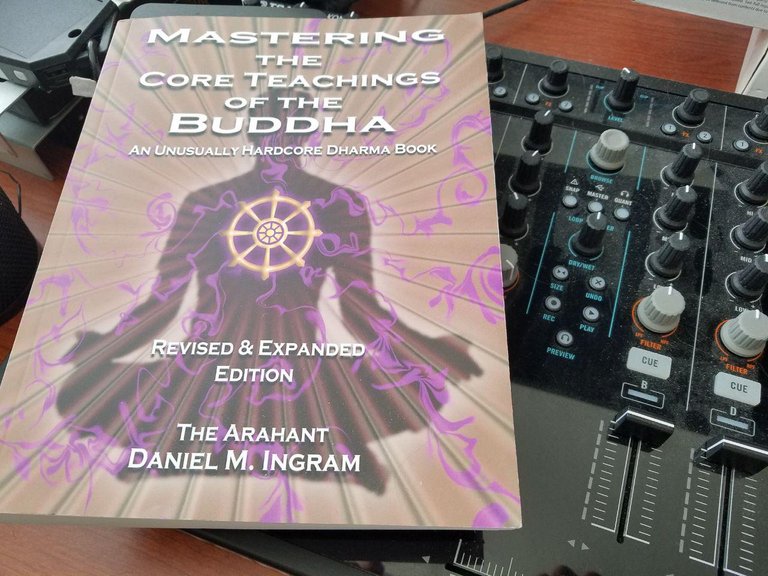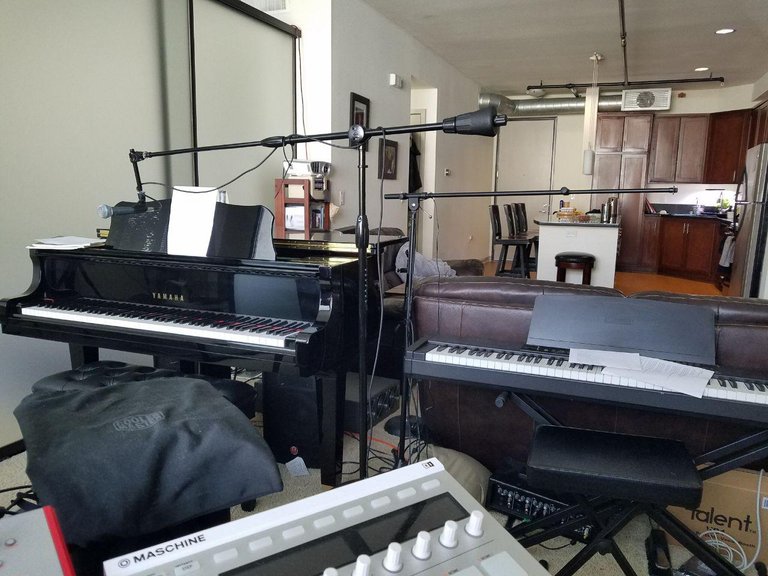So I have had my studio set up for a year now in my studio apartment (aptly named).

It is a far cry from what I once had, but is plenty for me to start getting creative again; if only I could actually make music. I find myself sitting and staring at my equipment like an artist at a blank canvas these days. When I was teen and in my 20s it was as if a song a minute ran through my brain. I was full-on creative at all times.

But something has happened to me in the last few years. It seems like the more financially successful I am, the less creative that I am. I don't know if there is some sort of angst from poverty that triggers creativity, but it sure seems to be the case for me! It is kind of like how when you are a kid, all you can think is how if you had money, you'd buy this and that. But then when you can afford it, you suddenly don't care about this and that anymore.
I think that is why I really needed this book:

Meditation has really helped me to look deeply at the way that I view myself and the world and see things more objectively. I think that I have also learned to forgive myself and give myself some slack. When one feels unable to be creative, it can be really frustrating. You can really start to beat yourself up over it!

You can really see that I am interested in making music! The difficult part is that it's not just a hobby; I have done a lot of music and sound design for games and film. After a member of my family died, and another got really sick I spent quite a lot of time and money providing emotional support for other members of the family. Only after the dust settled did I realize what an impact that all of this stress had on my ability to create.
I feel like I am finally starting to come out of the other side of this. I am really starting to realize that the distress that I went through created a blockage which I compounded by constantly beating my self up over a perceived failure. We have to learn to push forward and just let things be what they are. I know that I keep going, my mojo will return and I'll be able to enjoy the things that I love again with even more intensity!
here.Your post was manually selected by @edje and rewarded by @illuminati-inc (IINC) with the support of Curie. About IINC:
Oh, wow! Thanks for the support. Very appreciated.
I'm a bit late to catching up on your posts, probably because I've overloaded my feed a bit and missed 'em when they were originally posted.
But anyway, if you want to improve your motivation I've made a rambling post on it myself, that I realize now you shouldn't read because it's a bit wank, instead please read the most valuable titbit from it:
https://sloanreview.mit.edu/article/need-motivation-at-work-try-giving-advice/
I've been struggling with a bit of depression myself, but I've a plan to solve it! ;)
Hope to read more from you soon (well the next post actually, I haven't caught up yet..), and good luck!
Oh, wow. Yeah, I just read the post that you recommended. That makes a lot of sense to me. To me it is not only confidence that is generated by giving advice, but it is also the fact that in order to give advice, or teach even, you have to first hash out the problem in your head.
Part of the problem with getting out of a bad situation is that you may not fully understand the problem. Sometimes just talking about it helps. Many times I feel like there is a split between what I know to be true, and the actions that I actually take. Kind of like, do as I say - not as I do.
So the trick is to give advice to others, and then look back at that advice and follow it yourself. What do you think?
That seems to be the optimal method! Sometimes it may feel a bit hypocritical at first, but if you're honest about the fact that you're learning too and at least occasionally direct others to your own sources of knowledge (though it may be tough to trace all of them back) -- you'll feel much better about this shared learning process.
Also: Making notes, reviewing them and iterating on that knowledge could improve your "hash power" :) Sometimes it's just a handy ways to accelerate the natural process of inductive reasoning, other times it's good backup for tiny mental bookmarks. When the brain catches a glimpse of a useful pattern in can't quite make out yet, the time spent twisting neurons 'till the head hurts can usually be spent more productively elsewhere. Our brains are a super incredible tool that we barely know how to use and worse yet incorrect methods of using 'em have been drilled into many of us in early childhood when the brain is at its peak learning performance. It's never late to take back learning -- that time is now!
...I say all that as I've not made a post for several days now, as I've been mostly commenting on the posts by others or reading up on various materials -- that's also a form of iteration though :)
(Makes a note to hash out something for the blog today)
Hey! Thanks a lot. much appreciated. I have been a bit off the radar myself. I will check out your post :)